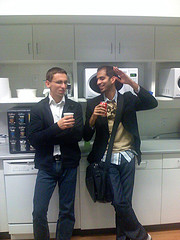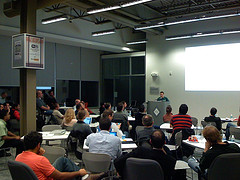 Jonas Brandon, David Crow and I made the trip from Toronto to Waterloo last night to attend StartupCamp Waterloo. Despite over 2 hours in traffic on the way there, we were happy that we went. What a great evening.
Jonas Brandon, David Crow and I made the trip from Toronto to Waterloo last night to attend StartupCamp Waterloo. Despite over 2 hours in traffic on the way there, we were happy that we went. What a great evening.
The room wasn’t packed, but there were just the right number of people there. Things were kicked off with Ali Asara from Well.ca who took us through the ups and downs of his search for funding for his startup. Ali was incredibly compelling and more than made up for the fact that Albert Lai couldn’t make it in time. Ali, who Toronto recently lost to Guelph, is quickly becoming one of my favorite guys in the startup scene around here.
I had intended to take notes on the evening, but I really just got too caught up in everything. After Ali’s presentation, it was time to have quick 2-minutes demos from a slew of startups, or potential startups. Despite some Facebook Delerium that was coursing around the room at times, which culminated in one startup being told to eschew any thought of making money and to just make a facebook app, there was a really genuine attempt to help each startup in thinking through their business plans and product development.
The startups that presented, that I made note of, were
- Village Toolbox ? Not yet launched. Wiki and social tools for actual, real-life, communities.
- CastRoller
- Zimride – A Facebook App
- Purple ? Community managed band calendars
- ContingencyWorks.com and his EpochBox idea.
The startup that really got my attention was Village Toolbox. Simon Clark has built a social-software platform for his own community. While the product is in it’s infancy (it didn’t look very refined), and there are quite a few competitors in this space, I think Simon really kind of gets it. A lot of the competitive tools, which we use in my condo are ugly in their own way, and aren’t built with the community in mind. My guess is that there is a lot of room to innovate here, both with the product and with the localized revenue opportunities.
 Simon’s question when he got up was: “should this stay as a hobby, or should I start taking it seriously”. My advice is: focus on the product, keep iterating it in your own community, and put it in a couple of others. Once you get it right, start spreading it out and then quit your day job when you can afford to, but no sooner.
Simon’s question when he got up was: “should this stay as a hobby, or should I start taking it seriously”. My advice is: focus on the product, keep iterating it in your own community, and put it in a couple of others. Once you get it right, start spreading it out and then quit your day job when you can afford to, but no sooner.
These startups were all very early stage, which will probably be the norm for events like this. There were a handful of more seasoned entrepreneurs in the audience however, and a lot of good advice flowed from them. It would be nice if startups would present some basic market research or target-audience information, because it can be hard to talk through problems without really understanding the end-user.
This is just getting started
By the time the evening was over, people were buzzing. The rapid-fire sessions, which nobody wanted to end, had us all excited. The entire event was very loosely planned, and it went off perfectly.
Startups were invited, the number of attendees was kept low, and the organizers let the audience set the pace. We learned a lot of lessons. StartupCamp is unique from DemoCamp in that it isn’t about demoing cool technology just to show it off (a line that was very fine at times), but instead it is about demoing a startup or idea with the intention of taking feedback, and heckling, from the audience. The entire night reminded me a lot of the first DemoCamp here in Toronto.
Keep the momentum going
So, here is the deal. We are going to keep up our end of the bargain and we are going to be hosting StartupCampToronto1 (watch that page — too tired to fill it in now) using the same model.
Now, the challenge we are sending out to all the other tech startup blogs: Run a StartupCamp in your city. Keep it simple and to the point. Let’s smoke out the entrepreneurs and see what, and who, is out there.
StartupCongress planning continues to take place, but in the spirit of startups, let’s just do it.
Leave a Reply